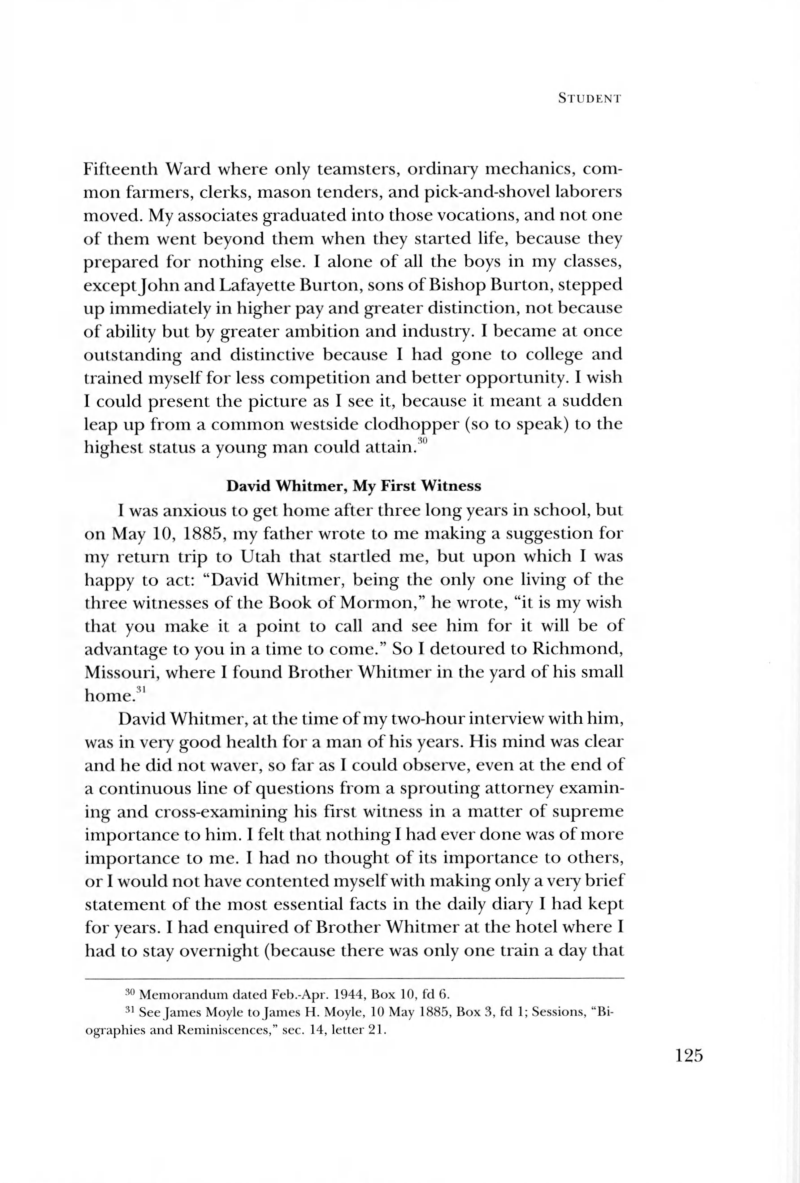James H. Moyle recalls his meeting with David Whitmer in ca. 1940 memoir and personal history.
- Type
- Book
- Source
- James H. Moyle LDS
- Hearsay
- DirectLate
- Reference
James H. Moyle, Memoir, ca. 1940, rep. in Gene A. Sessions, ed., Mormon Democrat: The Religious and Political Memoirs of James Henry Moyle (Salt Lake City, UT: Signature Books, 1998), 125–126
- Scribe/Publisher
- Signature Books
- Audience
- Reading Public
- Transcription
David Whitmer, My First Witness
I was anxious to get home after three long years in school, but on May 10, 1885, my father wrote to me making a suggestion for my return trip to Utah that startled me, but upon which I was happy to act: “David Whitmer, being the only one living of the three witnesses of the Book of Mormon,” he wrote, “it is my wish that you make it a point to call and see him for it will be of advantage to you in a time to come.” So I detoured to Richmond, Missouri, where I found Brother Whitmer in the yard of his small home.
David Whitmer, at the time of my two-hour interview with him, was in very good health for a man of his years. His mind was clear and he did not waver, so far as I could observe, even at the end of a continuous line of questions from a sprouting attorney examining and cross-examining his first witness in a matter of supreme importance to him. I felt that nothing I had ever done was of more importance to me. I had no thought of its importance to others, or I would not have contented myself with making only a very brief statement of the most essential facts in the daily diary I had kept for years. I had enquired of Brother Whitmer at the hotel where I had to stay overnight (because there was only one train a day that stopped at Richmond). The clerk said Whitmer was one of the very highly respected citizens of the community; the driver of the hack that ran from the train to the hotel told me the same. In fact, the same answer came from all I questioned and I missed no opportunity. Whitmer was slender, tall, and of an intellectual cast. He was frank and willing to respond and had the appearance of an honest, sincere but plain man of good countenance. He was quite gray, and the photographs the Church has show him without beard, but my recollection is that he had a full, long, white beard. I read in an interview while in Michigan that he had white hair and a patriarchal beard. It was a very impressive sight. I understood he was troubled with curiosity seekers and sometimes slow to see them on that account. So I was grateful he spoke with me for so long.
David Whitmer, the only one of the Three Witnesses who did not return to the Church or become reconciled to it, told me then in 1885 (just three years before his death) that he had never left the Church. “I have presided over a branch of the Church here in Richmond, Missouri, up to the present time.” He also claimed that Joseph Smith was a fallen prophet of God and that he accepted all that was revealed to him up to 1835. “When Sidney Rigdon obtained such influence over him, I did not know after 1835 whether his revelations came from God or Sidney Rigdon,” said Whitmer. “I have presided over this branch from that day to this and I have never denied the divinity of the Book of Mormon.” He also told me of a visit to him of Oliver Cowdery shortly before the latter’s death in which Oliver declared to him the divinity of the testimony they had borne concerning the Book of Mormon, and had appealed to Whitmer to continue to be true to it.
In later years I had occasion to feel very disappointed in myself over the Whitmer interview. Here I was a graduating law student and a young lawyer and I somehow failed to take an affidavit from Brother Whitmer.
- Citations in Mormonr Qnas
The B. H. Roberts Foundation is not owned by, operated by, or affiliated with the Church of Jesus Christ of Latter-day Saints.

